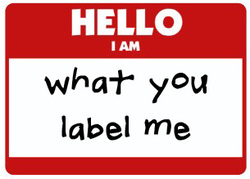Is it really that simple? Can you really influence behavior just by the way you label someone? At least psychologists and behavioral economists think so. How you frame someone can directly influence how they might behave. Try this with children. So many times a bad behavior can be reinforced just by how a label is applied. You wonder why certain kids in their terrible twos continue to be terrible way beyond? Some of it has to do with how they were labelled as a child. The bad kids turned out to be the bad boys it seems. At that tender age how you react and label them can reinforce good or bad behavior! Don’t believe it. An experiment was conducted at a school. Three groups were taken. Group 1 was the neat group but they were especially labelled to be “extremely neat” while Group 2 was similar but they weren’t labelled as such. The third group was a control group. So what was was the learning? You guessed it. The group labelled the most neat behaved most neatly as well. Labels can influence behavior.
Another experiment was conducted using a modified version of “Prisoner’s Dilemma.” It led to similar results. What is Prisoner’s Dilemma? It is an experiment when two prisoners are questioned separately. And the outcomes can be one of three scenarios. If both stay quiet they both get 6 months in prison but if one of them calls out the other he walks away but the their partner gets 10 years in prison. So if they can both trust each other to keep quiet they would be get away with a minimal 6 months in prison otherwise either one can get away by selling out their partner. So what was the modification? The labelling. In one scenario the game was called the Wall Street game and in the other it was called the Community game. The results. 66% cooperated for mutual benefit in the Community Game but the results halved to 33% in the Wall Street game. Why? The labelling influenced behavior. Just by being framed as a community mutual gain became the default option. Unlike the Wall Street mindset which is all business and typically a zero-sum game.
This could have wide implications. From how one can reinforce positive behavior in children to how one can influence their audience in the real world. Of course this is more useful at a school or at home to improve the behavior of children. In other situations there is a possibility to be down right manipulative. The only positive use I can think of as a rule of thumb is to evoke a different mindset for a greater good perhaps from a community perspective. For example, if management is thinking about laying off employees to meet a certain cost target their mindset can be altered by evoking a label of a nurturer and provider rather than that of a Financial Controller for example. This could be done to make them see things from a different perspective and therefore alter their decision or look at other ways to achieve their goal. Again like all concepts in behavioral economics there is always room to abuse these principles for personal gain. Either way application is matter of skill. This perhaps is one of the tools that the greatest of salesmen amongst us would use to move people through the power of labelling. Beyond it’s use as a parent or a caretaker of children would you ever try labelling in an adult setting without being manipulative? Let me know your thoughts in the comment section below.

